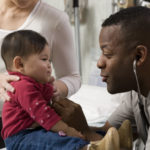
Nurses who specialize in pediatrics devote their knowledge and skills to caring for children from infancy through the late teen years and their families. These specialized nurses usually complete advanced training in pediatrics and collaborate closely with physicians and other health care providers who share their dedication to children’s health.
Like other nurses, pediatric nurses can perform physical examinations, measure vital statistics, take blood and urine samples and order diagnostic tests. Nurses with advanced training can interpret test results to form diagnoses and develop treatment plans.
Parents often prefer to have their children treated by pediatric specialists, because children have special health care needs. Their bodies are growing and changing, and they often react differently to injury, illness and even common medications.
In addition, children get scared and can’t always clearly communicate “what hurts.” Pediatric nurses know how to talk to children and how to dispel their fears. They also know how to ask children questions about their health, so they can gather complete and accurate information to aid in diagnosis and treatment.
In addition to caring for patients with injuries and illnesses, pediatric nurses spend a significant amount of time educating parents and other caregivers about how to care for their children and protect children’s health. For families of children with chronic conditions, such as juvenile diabetes or paralysis, they design home care plans to help the families meet their child’s special needs.
Prevention and health education is a big part of pediatric nursing. Pediatric nurses often staff community health fairs and visit schools to perform physical exams, immunize children and provide routine developmental health screenings.
Pediatric nursing is a very special vocation, because it provides the opportunity to play a key role in a child’s life when that child needs you most.
Working Conditions
Pediatric nurses work in doctor’s offices, clinics, hospitals, surgical centers and other health care settings. Their skills bring particular comfort to children being treated in acute care departments, such as the neonatal unit, pediatric critical care unit and pediatric oncology ward, and to their parents.
Pediatric nurses also work in schools, in private practice and for community groups and other organizations that provide outpatient and preventive health care services for children, including children who have limited access to health care.
In most cases, the pediatric nurse works closely with a physician who also specializes in pediatric or family medicine. Pediatric nursing duties are similar to nursing duties in other departments, although there is typically more interaction with the patient’s family.
Working with children who are sick is emotionally draining so it’s important to take good care of yourself if you choose to work in this profession. Burnout is common among pediatric nurses.
Salary Range and Outlook
Pediatric nurses earn $52,000 to $88,850 a year, although compensation depends on the level of education, experience, geographic location and the type of facility where they work. Experienced pediatric nurses can earn $100,000 a year or more.
Academic Requirements
To become a pediatric nurse, you must first achieve certification as a registered nurse (RN). To do that, the first step is to earn a Bachelor of Science in Nursing (BSN) degree. While you may also choose to earn a nursing diploma or associate degree, which takes three years, a BSN will make it easier for you to find a job. Currently, 55% of the nursing workforce holds a baccalaureate degree or higher. Recent research indicates that patients are safer and have better outcomes when they’re under the care of nurses with at least a baccalaureate-level education in nursing.
While you’re in college, make sure to take classes in early childhood development. You can also try to find a job or volunteer at a pediatrician’s office, in a day care center or school or another job that involves caring for children.
Once you graduate, you will have to take and pass the NCLEX-RN, a national licensing exam, to practice as a registered nurse. Then you can find a job as an RN in the office of a pediatrician or family doctor or in the pediatric department of a hospital.
Take advantage of in-service training and other opportunities to learn more about the unique health and developmental needs of children and adolescents. If you want to work with newborns (neonatal care), children who have cancer, children with emotional or developmental disabilities or children who are critically ill, you may need additional training in those nursing skills, as well.
Once you have gained some experience, you can pursue specialized training toward a certificate in pediatric nursing. Or you may choose to earn a master’s degree in nursing to become a pediatric nurse practitioner or a clinical nurse specialist in pediatrics. Pediatric nurse practitioners are allowed to make diagnoses, prescribe medication and manage care. To become a pediatric nurse practitioner or clinical nurse specialist, you have to take an exam and meet state certification and continuing education requirements. (Find more information on the certification exam for pediatric nurse practitioner and clinical nurse specialist.)
In addition to nursing knowledge and practical skills, pediatric nurses must have the ability to form rapid connections with their juvenile patients. Children are often afraid to go to the doctor, so the pediatric nurse must be able to dispel that fear and quickly earn the child’s trust. These skills can be learned, but many pediatric nurses are people who are naturally good with kids.
It also helps to be a quick thinker who can stay calm under pressure. Children know when an adult seems worried, so pediatric nurses must be able to smile through even the most distressing situations.
Learn More About a Career as a Pediatric Nurse
- Take a look at the Pediatric Nursing Certification Board’s Your Future in Pediatric Nursing for a variety of information.
Resources
- National Association of Pediatric Nurse Practitioners
- Association of Women's Health, Obstetric, and Neonatal Nurses
- American Academy of Pediatrics
- National Association of Neonatal Nurses
- Society of Pediatric Nurses
